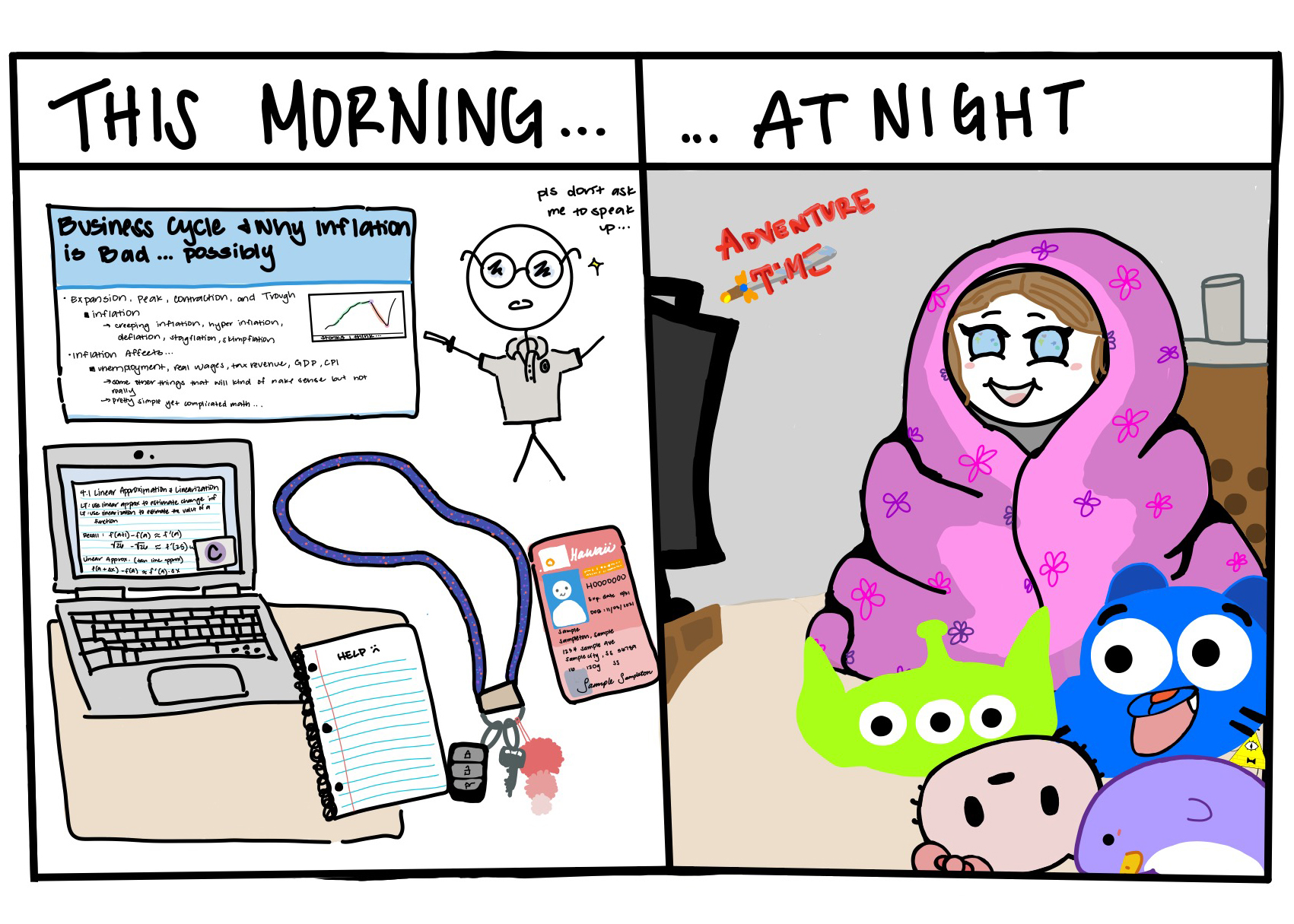Why I Still Love Cartoons

Lately, as I’ve been filling out my college applications, I’ve spent sometime pondering the meaning of life and what I want to do with my own. More often than not, I find myself rewatching some of my favorite cartoons. Adventure Time, Gravity Falls, and The Amazing World of Gumball were my go-to shows as a child and still are.
I remember when The Amazing World of Gumball was briefly cancelled from Cartoon Network and how confused and upset I was. And then how happy and relieved I felt when the show resumed airing again. On Mondays, when I was small, my grandparents would take my brother and me to my great-aunt’s house. My older aunties and uncles joined, turning it into a mini family get-together. They sat around an old coffee table during cocktail hour, eating and drinking while my brother and I watched TV. I didn’t particularly like going to these get-togethers; however, I enjoyed the cartoons on TV as they took me away from my relatives’ boring conversations about politics or whatever grown-up topic that came up that day. These Monday visits stopped after my brother and I started attending HBA, and I didn’t think about going again as my life grew busier. In hindsight, I miss those Mondays and wish my family still got together. Many of those relatives now are dead or are in nursing homes, and I haven’t seen many of them in a long time, no thanks to Covid.
Now that I am entering adulthood, those cartoons are no longer just distractions from boring conversations; they are memories from the childhood I so desperately cling to. The characters’ fantastical adventures and the magical beasts are still entertaining and easily pull me away from reality, but the overarching themes are more applicable and relatable now that I am older. I appreciate the art style and plot more than I did as a child. Perhaps I never really understood, or tried to understand and appreciate the complexities of the shows before. Maybe the countless times I have read and analyzed a story for English, desperately searching the text for the deeper meaning, or sketched and discarded many storyboards for my film and mixed media classes, have led me to appreciate the creativity and talent these producers have. Their talent is awe-inspiring, so much so that these animations are works of art.
The complexities of seemingly simple cartoon characters like Princess Bubblegum, Grunkle Stan, and Richard Watterson are now apparent. Richard may seem childish and lazy, but he is a fantastic father. He connects with his children on an emotional plane that some people lack in their own lives. On the other hand, Princess Bubblegum is a nice person and cares about all her candy citizens, but creates Lemongrab in one of her experiments and endows him with an inability to get along with others. She essentially creates him to be an outcast, which makes me question her morals. Grunkle Stan obviously has moral issues—we all knew that from day one—but does saving his brother excuse his lies and criminal past? For the most part many of the characters are good at the core and we tend to like them regardless of their flaws. We’ve grown attached to them and want them to be good. More often than not many of us know a Grunkle Stan or Richard Watterson in real life, or perhaps we’re PB and give our own creations odd personalities. Whatever it may be, many of us relate and empathize with these cartoon characters on a deeper, more personal level. We have integrated and preserved these characters in social media in the form of memes or tik tok audios, which essentially are becoming a part of our generation’s culture.
Consistently in these cartoons, most of the characters aren’t human and vary in species, color, size, and language. They include LGBTQ+ characters, depict women empowerment, and attempt to break gender stereotypes. Many of the cartoons that we grew up watching address the social issues that have been in play for most of our lives. Many of us are more accepting of different sexualties, ethnicity, culture, and religion; we support women’s suffrage, feminism, and body positivity. Many in our generation are fighting to break gender stereotypes and redefine what it means to be masculine or feminine. I believe addressing mental health, global warming, and these other social issues will be defining characteristics of our generation. Of course I didn’t recognize these things when I was a wee lad and now I see that perhaps they have subconsciously shaped my world views.
To me these cartoons are not just childhood memories or TV shows I’ll reference in thirty years; they are symbols of our evolving society. We are the next generation to enter the great unknown of adulthood and soon some of us will be having children of our own. We will be the ones to teach them to take care of our planet, accept people’s differences, and fight for equality. If you were one of those poor children that did not get to watch cartoons when you were younger and have not related to any of this at all, I’m sorry you had a sad childhood. I’m just kidding. I encourage you to watch or rewatch these shows with fresh, new eyes. Maybe you too will find that the analytical skills you learned in English class will help you appreciate the complexities of these fantastic shows.
